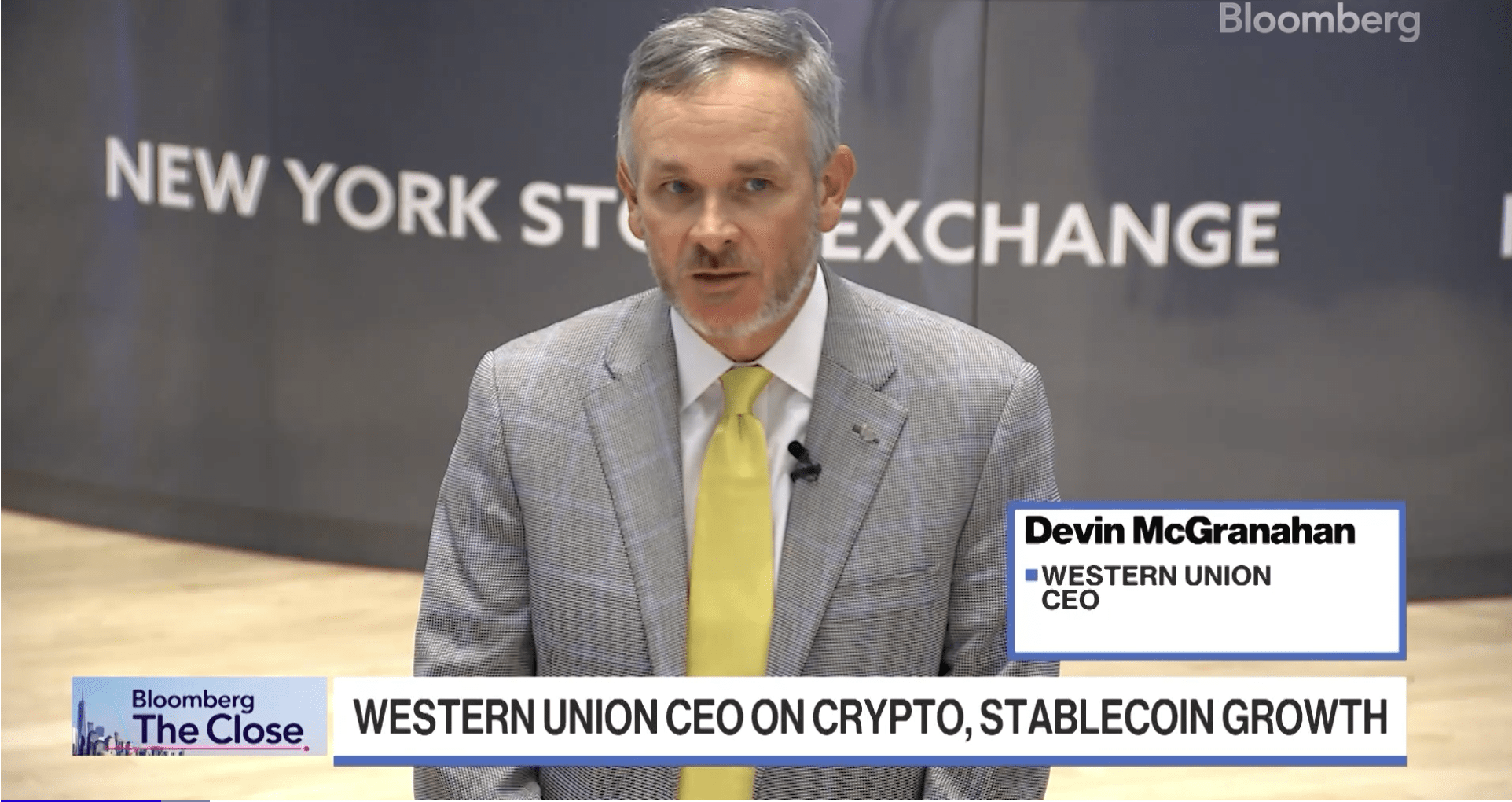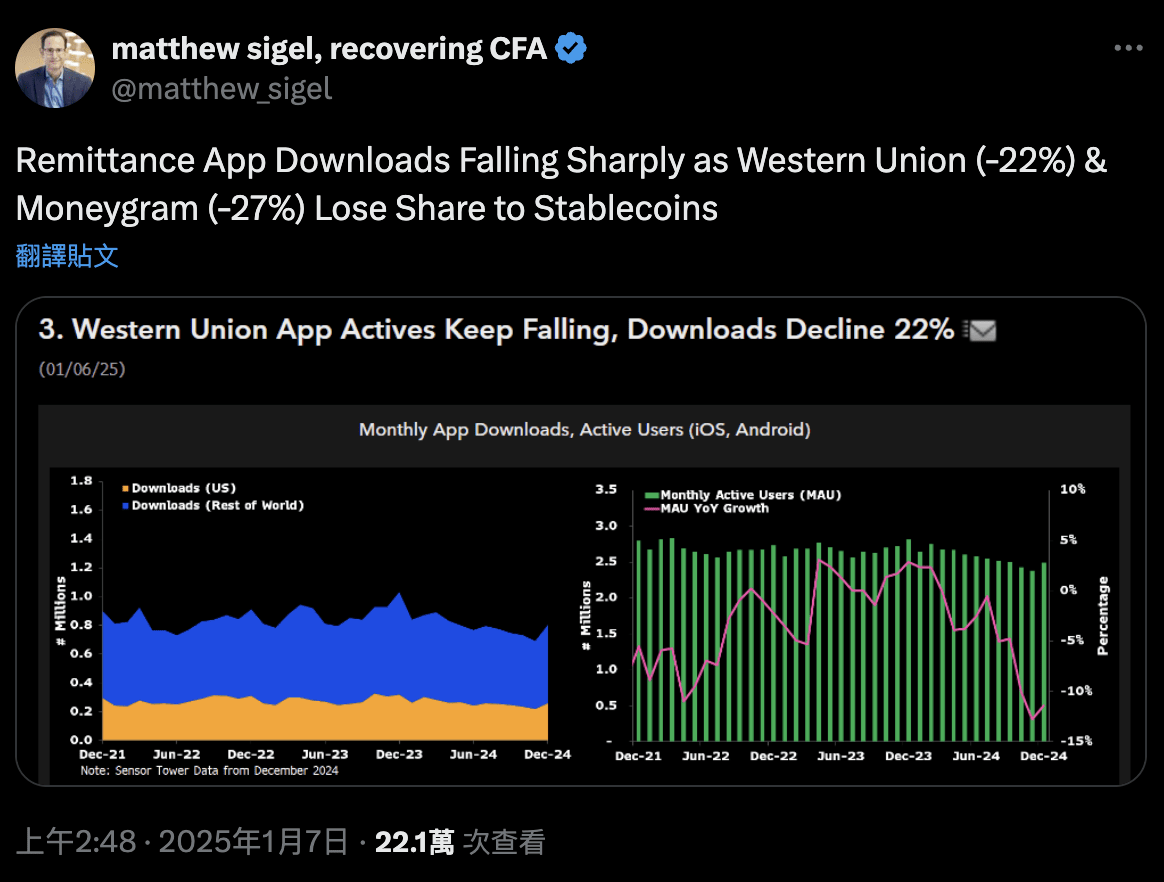Western Union CEO announces stablecoin integration plan, seeing it as an opportunity rather than a threat.
Global remittance giant Western Union is actively assessing the integration of stablecoins into its digital wallet infrastructure to respond to the trend of stablecoins gaining mainstream acceptance following the passage of the (GENIUS Act). Western Union CEO Devin McGranahan stated in a Bloomberg interview on Monday that the company is exploring partnerships to provide deposit and withdrawal services, allowing customers to buy and sell stablecoins.
 Source: (Bloomberg) Western Union CEO Devin McGranahan stated that the company is exploring partnerships to provide deposit and withdrawal services, enabling customers to buy and sell stablecoins.
Source: (Bloomberg) Western Union CEO Devin McGranahan stated that the company is exploring partnerships to provide deposit and withdrawal services, enabling customers to buy and sell stablecoins.
McGranahan emphasized: "We see stablecoins as an opportunity, not a threat. We have a 175-year history of innovating, and stablecoins are just another opportunity for our innovation."
He pointed out that Western Union sees three key opportunities in the stablecoin service: achieving faster cross-border transfers, facilitating conversions between stablecoins and fiat currencies, and providing value storage tools for customers in volatile economies.
The company is currently testing new settlement processes involving stablecoins in South America and Africa. McGranahan revealed that Western Union is working with infrastructure companies to improve foreign exchange conversion and settlement speeds. Additionally, the company is exploring partnerships with major players in the cryptocurrency industry to provide deposit and withdrawal services for cryptocurrencies in specific jurisdictions and is considering launching stablecoin wallet products.
The GENIUS Act provides regulatory clarity, driving traditional financial institutions to enter the market.
McGranahan's comments came as U.S. President Trump signed the (GENIUS Act) into law last week, establishing a formal U.S. regulatory framework for the issuance and trading of stablecoins. This legislation requires that stablecoins be 100% backed by U.S. dollars or other highly liquid assets and imposes annual audit requirements on issuers with a market capitalization exceeding $50 billion.
The passage of the (GENIUS Act) is expected to accelerate adoption by banks, retailers, and traditional financial players, many of which have recently expressed interest in entering this industry. The act also prohibits unsecured algorithmic stablecoins and requires issuers to comply with anti-money laundering rules. In the event of issuer bankruptcy, stablecoin holders are now also considered priority creditors.
Dante Disparte, chief strategy officer of leading stablecoin issuer Circle, stated that the (GENIUS Act) will also prevent tech giants and Wall Street large institutions from dominating the stablecoin market. He noted that any non-bank entity wishing to issue dollar-pegged tokens must establish "an independent entity that looks more like Circle than a bank."
The traditional remittance industry faces challenges from stablecoins, with competitors taking the lead.
The actions of Western Union reflect the growing pressure faced by traditional financial intermediaries from native stablecoin solutions that offer faster and cheaper transfer services. According to World Bank data, global remittances are projected to reach approximately $685 billion in 2024, but the costs of these transactions remain high. The average cost of sending $200 through traditional cash-to-cash networks in the first quarter of 2024 was 6.6%, more than twice the United Nations Sustainable Development Goal of 3%.
Competitors have already taken the lead. MoneyGram launched MoneyGram Wallet in 2024, allowing users to send remittances in $USDC stablecoin and withdraw cash at agents in 180 countries. PayPal has also integrated its $PYUSD stablecoin into the international payment track. Meanwhile, new banks like Revolut and even traditional financial institutions are actively seeking licenses to issue their own dollar-pegged tokens.
VanEck digital asset research director Matthew Sigel revealed in a post in January that downloads of the remittance giant's app have significantly declined, with Western Union down 22% and MoneyGram down 27%. Western Union's first-quarter revenue was $984 million, a 6% decrease from the same period last year, indicating the company is facing pressure in an increasingly competitive environment.
 Source: X/@matthew_sigel VanEck digital asset research director Matthew Sigel indicated that downloads of the remittance giant's app have significantly declined.
Source: X/@matthew_sigel VanEck digital asset research director Matthew Sigel indicated that downloads of the remittance giant's app have significantly declined.
The stablecoin market is growing rapidly, and Western Union is seeking differentiation strategies.
According to DefiLlama data, the total market capitalization of stablecoins has reached a historic high of $262.4 billion. The total value of reserves backed by Treasury bonds among leading stablecoins is now estimated to exceed $150 billion, potentially reaching $2 trillion by 2028 under high adoption scenarios.
 Source: DefiLlama The total market capitalization of stablecoins has reached a historic high of $262.4 billion.
Source: DefiLlama The total market capitalization of stablecoins has reached a historic high of $262.4 billion.
McGranahan emphasized that the key advantages of stablecoins lie in speed, cost, and accessibility. He stated: "The last time I checked, if you wanted to buy a Coca-Cola, you couldn't pay with stablecoins, so converting stablecoins to fiat currency, especially in harder-to-convert currencies, is an opportunity for us."
Although Western Union has not disclosed which stablecoins or blockchains it is using, nor clarified whether the wallet products under consideration are proprietary or partnership models, the company emphasizes that it will adopt a cautious pilot testing approach rather than a full conversion strategy.
『Focus on the trend of stablecoins! Western Union evaluates wallet and remittance services to accelerate cross-border payments』This article was first published on 'Crypto City'


